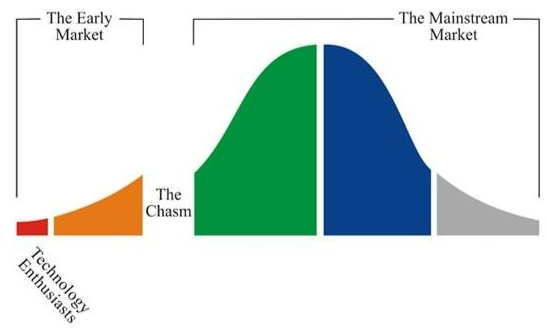Early-stage startups all face a similar problem. You’re creating something new, and you need to prove two things:
- That your solution is worth buying
- That your young company is reliable and trustworthy
No small feat! Especially when your market at this point is largely “early adopters,” and you’re trying to cross the chasm to the “early majority.”
But online reviews and customer recommendations can help you prove both, leading to more customers and other benefits. I’ll show you how to take advantage of this opportunity with steps that have worked for us and our peers.

Depiction of crossing the chasm from early customers to the full market. Credit: CoBloom
Why use online reviews for startup growth?
Online reviews are perhaps your No. 1 marketing asset, for two reasons.
1. Potential customers don’t care about your opinions.
Of course you’re going to say your product and company are great! But as a consumer, I don’t know you yet, and I can’t trust you. Instead, I want to see unfiltered opinions from your current customers. So I’ll turn to online review platforms like Google or G2 to see what customers actually think about you.
If you don’t have reviews on these platforms, you’re losing customers.
2. Inbound marketing takes time to build.
You’re creating a new market and people are not actively seeking out your solution—yet. But they will be, and you’re trying to make sure they find you instead of a competitor.
Online reviews will help you rank higher in search results, and help you earn a place on “Top 10” and “Best [XYZ] Providers” lists. Once you make it on a couple of those, you’re likely to get on more, and before long you’re the recommended solution across the web. That’s the dream.
This valuable work takes time to produce, so it’s best to start early.
Register for Small Business Digital Ready to discover and access free small business-focused events.
How to get online reviews
It really just takes two steps.
1. Provide incredible customer experiences.
Customers will leave reviews and refer others to you only if they’ve had a great experience. Here’s three things to do to create those great experiences.
- Solve their problem. Customers don’t care about you or your solution as much as they care about solving their problems. Your product has to do what you say it will.
- Work right the first time and every time. Unreliable products—products that only work some of the time—cause more headaches than they’re worth. You need to prove you’re reliable and trustworthy day-in and day-out.
- Be good to work with. This is the tipping point for creating great experiences that customers are willing to talk about. The review or referral will be as much about you personally as it will be about your product, so be quick to respond, helpful, considerate, available, open to feedback, and respectful—be a joy to work with.
2. Ask!
Customers are unlikely to review and recommend you all on their own. They need a bit of prodding. You’re close to these customers, so use your judgment for when’s best to ask, but here are a few things to consider:
- Timing: Wait long enough that the customer has gotten value from you, but not so long that they’ve forgotten about that great experience.
- The Ask: Ask through whatever channels you have available. For online reviews, using email and text messaging together tends to work best. For referrals, in-person meetings do best, but any open communication channel works.
- Follow-Up: For an online review, make sure you respond to that review publicly. Potential buyers will want to see that you’re engaged, and your existing customers will appreciate the thanks. If customers give some other kind of recommendation or referral, personally thank them, and consider a gift like a discount on services or a gift card.
How many reviews or recommendations do you need?
The number of reviews or recommendations you need depends on several factors, but as a rule of thumb, you’re best taking a quantity approach to online reviews, and a quality approach to recommendations.
For reviews:
Look at how many online reviews your competitors have on key review platforms. Make sure you earn more than them. Star rating matters, but number of reviews and how frequently you get new reviews matter more.
For recommendations:
For case studies or testimonials that will live on your website or be used in your sales materials, you really just need one great case study or testimonial for each of your core customer types.
More is helpful, but it’s better to have one great case study that breaks down their problem, why they chose you, and results they’ve seen (including hard numbers) than it is to have lots of mediocre case studies.
Be sure to make these assets easy for customers to share with others, too. More on that in a moment.
If you focus on both reviews and recommendations, then you’ll definitely turn early customers into referral sources, and more new customers will buy from you.
Action steps to get more reviews
1. Start priming every customer.
Make sure you’re talking about outcomes from your first customer conversations, all the way through their lifecycle. You want customers thinking about the money they’re investing in you, and what dollars or other metrics they’re getting in return.
This is helpful for reviews and recommendations—and for customer retention—because they can clearly articulate your value to themselves and to others. After that, you just have to remember to ask.
2. Enable customers to recommend you on their own.
Customers are unlikely to review or recommend without being prompted, so see how you can weave incentives and prompts into your daily customer interactions. A few that have worked for us are:
- Adding a review request into our standard Customer Success communications
- Rewarding customers for giving feedback (positive or negative)
- Creating email and text message templates that customers can send to others
- Packaging resources together that customers can easily share with others they want to recommend us to
3. Consider whether you need a review management tool.
You may have a low enough volume of customers that asking for reviews and managing those reviews across platforms is easy. As you grow, you’ll likely want a review management platform to help you do it. Tracking reviews as a key performance indicator (KPI) will become important, and you’ll likely want to manage that in one place, rather than hopping around platforms.
However you choose to do it, just be sure to focus on continually earning online reviews and recommendations. The growth of your startup may just depend on it.






